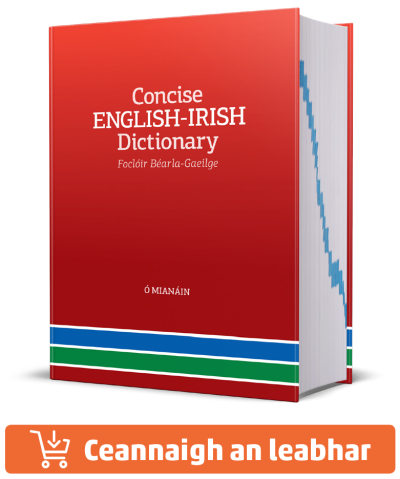Foclóir Gaeilge–Béarla
Ó Dónaill, 1977
An Foclóir Beag
Ó Dónaill & Ua Maoileoin, 1991
English–Irish Dictionary
de Bhaldraithe, 1959
Gramadach
Foghraíocht
haspa
hata
hatadóir
hatán
hath
hatóir
Haváíoch
hé
héach
heacsán
heacsós
héad
héadónach
héadónachas
héadónaí
héadónaíoch
héala-
héalóta
héalótachas
heaptán
hearóin
heatróis
CUARDACH DROIM AR AIS
IN FOCLÓIR GAEILGE—BÉARLA
ABAIRTÍ
IN FOCLÓIR GAEILGE—BÉARLA
Tá sé ar m’~ ó mhaidin, it has been on my mind all day.
Tá an t-~ againn feasta, we have the long nights from now on.
Níor ~ sé aige é, it had no effect on him; it was inadequate for his needs.
Tháinig sé ~ go maith le bliain, he has come on well during the past year.
Bhí sé ar bharr mo theanga agam, I had it on the tip of my tongue, I was about to say it.
Tá mé ar mo bhoinn ó mhaidin, I have been on my feet all day.
Tá sé ar a bhoinn arís, he has recovered his health, he is on his feet again.
Is mór a bhorr na daoine sin, those people have got on well in the world.
Tá sé ag brath ar chailín as an áit seo, he has his eye on a girl from this place.
Tabhair do bhreithiúnas air seo, let me have your verdict on this matter.
An bhfuil dada ar ~ anocht agaibh? Have you anything on tonight?
Is fearr duit a chabhair ná a chealg, it is better for you to have him on your side than against you.
Tá an ~ go maith agat leis, you have it on good authority, I’m sure.
~eadh go leor leat, enough has been spent, wasted, on you.
Níl aon chall agat dó, chuige, you have no call on it, no right to it.
Níl aon chall acu chun a chéile, they have no claim on each other; there is no relationship between them.
Bhí scian faoina choim leis, he had a knife under his cloak, concealed on his person.
Bhí ~ mhór leo an lá a pósadh iad, they had a great retinue of guests on their wedding day.
Bhí ~ fear, capall, aige, he had men, horses, working for him on a reciprocal basis.
Bhí ~ mór leis an lá a d’imigh sé, he had a great send-off on the day he left.
Tá slaghdán ina chrioslaigh, the cold has got a grip on him.
Bhí a chasóg ar a chuisle aige, he had his coat on his arm.
Níl aon chur isteach agat ar mo chuid talún, you have no right to be on my land.
Tá an slaghdán i n~ ionam, the cold has got a grip on me.
De bharr a bhfuil ráite, on account of what has been said.
Tú féin faoi ~ é, you are the cause of it yourself, you have brought it on yourself.
Tá droim ~ aige, he has no load on his back; he is an idler.
I n~ go ndéanfadh Dia trócaire air, hoping that God would have mercy on him.
Tá sé ar an ~ le fada, he has been on the booze, has been leading a wild life, this long time.
Tá ~ an mhagaidh air, he has a mocking grin on his face.
Seilbh a bheith agat ar do dhúchas, to own one’s ancestral estate; to have a grip on one’s heritage.
Bhí ~ air chomh fada le bliain, he wore a very long face, had an extremely dismal expression on his face.
Táimid in ~ an iomaire deiridh, we have made a start on the last ridge.
Má tá rud le héileamh agat orm, if you have any claim on me; if I owe you something.
An chéad ~ dó le mí, the first time he has been on his feet in a month.
Tá sé ina fhásach orm, it has grown wild on me, gone beyond me.
Tabhair mo shuaimhneas dom ~, let me have peace from now on; it is time you let me have peace.
Chuaigh mo chuid cainte i bh~ air, my words had their effect on him.
Is iomaí ~ orm, I have many claims on my time.
Tá sé ar bharr a ghoib aige, he has it on the tip of his tongue.
Is gránna an ~ atá air, he has an ugly grin on his face.
Tá sé ar éill aici, she has him on a string.
A raibh in ~ orm, all the clothes which I had on.
Ní raibh aon phingin ar ~ agam, I had no money on me.
Aithním go bhfuil trioblóid ar ~ agat, I can see that you have a load of trouble on your mind.
Tá fear eile ~ ina áit, another man has come on in his place.
D’~ a bheith ar rud, to have one’s attention on sth.
Bhí ~ mór agam leis, I had to do a lot of work on it.
Tarraingt na láimhe de rud a bheith agat, to have sth. to draw on; to have enough of sth. for one’s needs.
Cúl láimhe a bheith agat, to have something to fall back on.
